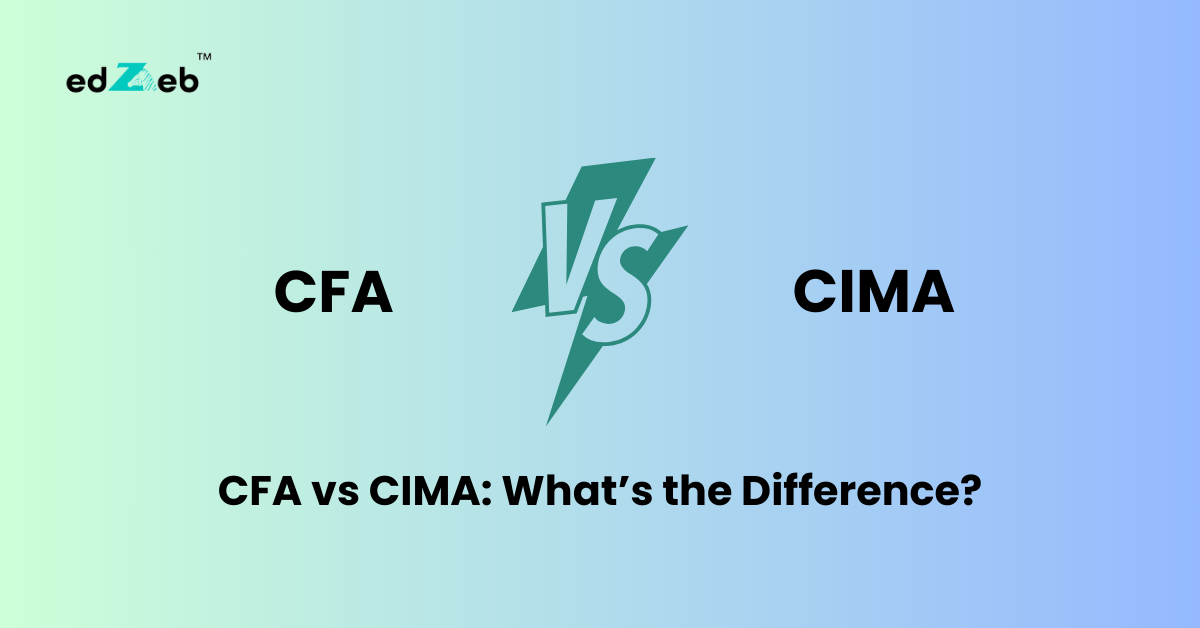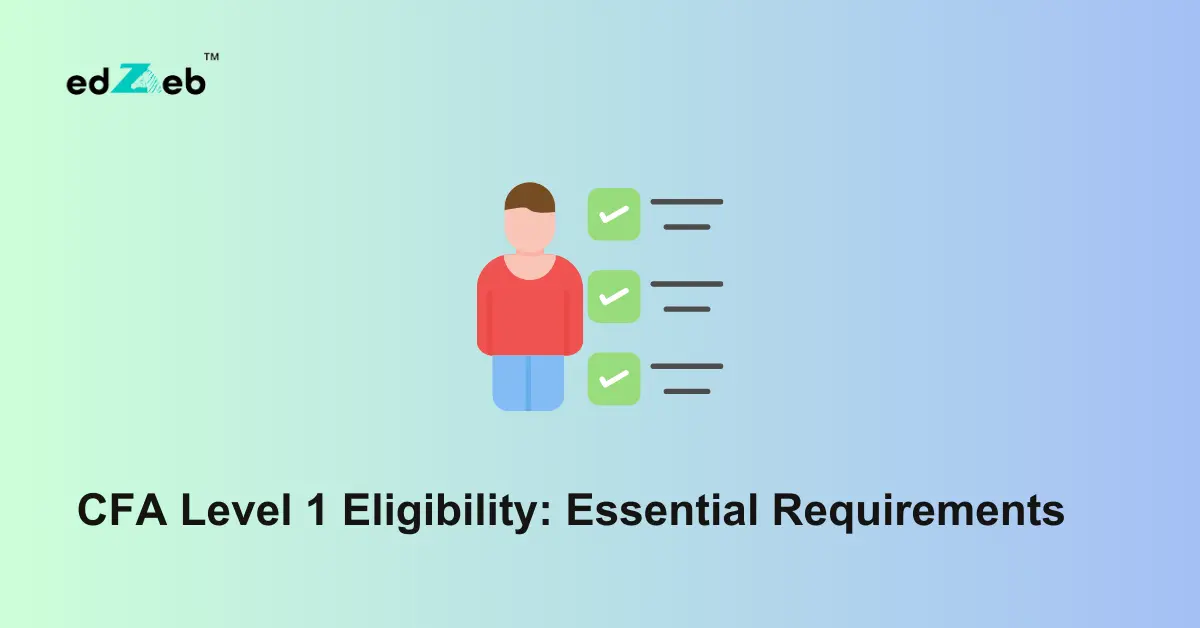
As you progress in your CFA journey with us at edZeb, we would like to take this opportunity to inform you about the CFA Level 2 syllabus. This blog will include other aspects of the Level 2 CFA syllabus like various topics covered, CFA Level 2 weightage, and the exam format.
Read further to stay updated on what you can expect while preparing for the CFA level 2 exam.
Table of Contents:
CFA: An Overview
CFA stands for Chartered Financial Analyst. It is one of the globally recognized certifications. CFA is known as the gold standard in the investment industry. The CFA program has three levels. Every level is based on the previous one. So, when you go step by step in that sequence, each level gets pretty tough. Your core competence in economics, finance, and ethics is embedded in Level 1. Then, a giant leap forward is attained to the CFA 2 curriculum.
It mainly deals with complex investment products and appraisal techniques. Through case studies of actual companies, the students sharpen their analytical skills. It prepares them for higher levels and bestows upon the esteemed CFA charter. Thus, holding a CFA charter is concrete proof of your professionalism and ethics in the financial sector.
CFA Level 2 Syllabus
The curriculum hints about the practical application of financial principles, global accounting standards, and ethical practices. This CFA Level 2 syllabus prepares students to tackle real-world challenges with confidence and competence. So, if you wonder, does the CFA Level 2 curriculum delve deeper into equity valuation, financial reporting, portfolio management, and fixed income topics?
Then, the answer is Yes. Yes, it does put a strong focus on applying analytical skills to real-world scenarios. The CFA 2 curriculum Level challenges students to connect theoretical concepts with practical decision-making. Therefore, prepare them for jobs that require quite advanced financial analysis, too, with strategic thinking. Some topics covered in the level 2 CFA syllabus include:
Quantitative Methods
It deals with the quantitative concepts and techniques in financial analysis and investment decision-making. It includes descriptive statistics, return distributions, and probability theory’s application in quantifying risk for investment decision-making.
Economics
Economics is all about supply and demand concepts for consumers and firms. However, it also covers market structures, macroeconomic principles, aggregate output and income measurement, demand and supply analysis, and economic growth factors.
Financial Statement Analysis
This financial statement analysis subject provides an in-depth explanation of financial reporting procedures, standards, basic financial statements, alternative accounting methods, primary financial statements, and a general framework for financial statement analysis.
Corporate Issuers
It covers corporate governance, investing, financing decisions, stakeholder management, and environmental and social considerations in investing. The subject also explains how companies use leverage and manage working capital.
Equity Investments
This subject deals with equity investments, security markets, and indexes. Also, highlighting their importance for long-term growth and diversification, and the use of basic equity valuation models.
Fixed Income
It will provide you with an in-depth understanding of fixed-income securities, their markets, yield measures, risk factors, valuation measurements, bond returns, and credit analysis principles.
Derivatives
It is about the conceptual framework for understanding derivatives and markets. Also, introduces valuation concepts for forward commitments like forwards, futures, swaps, and contingent claims.
Alternative Investments
This subject is all about alternative investments for higher returns like hedge funds, private equity, real estate, commodities, and infrastructure.
Portfolio Management
In this topic, we explain the fundamentals of portfolio and risk management using the capital asset pricing model for optimal risk identification. It includes return measurement, planning, construction, investor needs, and investment solutions.
Ethical and Professional Standards
The ethical and professional standards focus on the importance of ethics in the investment industry, examining the CFA Institute Code of Ethics, Standards of Professional Conduct, and GIPS.
CFA Level 2 Subjects Weightage Breakdown
The CFA Level 2 subjects covered throughout the course remain the same across all 3 levels. However, the CFA Level 2 weightage of the subjects varies according to the complexity and focus of each level. While Level I emphasizes foundational knowledge and basic concepts, the CFA II curriculum shifts towards applying analytical skills with more detailed case studies. Level III, on the other hand, focuses heavily on portfolio management and wealth planning, testing the ability to integrate and apply knowledge across different financial scenarios. The table below briefly describes the CFA Level 2 exam weight.
Subject | Level I | Level II | Level III |
Ethical and Professional Standards | 15-20% | 10-15% | 10-15% |
Quantitative Methods | 6-9% | 5-10% | 0% |
Economics | 6-9% | 5-10% | 5-10% |
Financial Statement Analysis | 11-14% | 10-15% | 0% |
Corporate Issuers | 6-9% | 5-10% | 0% |
Equity Investments | 11-14% | 10-15% | 10-15% |
Fixed Income | 11-14% | 10-15% | 15-20% |
Derivatives | 5-8% | 5-10% | 5-10% |
| Alternative Investments | 7-10% | 5-10% | 5-10% |
Latest Changes and Updates in CFA Level 2 Curriculum
The curriculum CFA Level 2 has undergone a few changes and next year in 2025 these changes will be enforced.
- Firstly, all the reading modules will now be transitioning to learning modules accommodating the study habits of the candidates. It includes visual aids to cover a module in single-evening study sessions. It incorporates more practically relevant content for finance careers.
- Some of the CFA Level 2 topics like statistics, microeconomics, and the time value of money are available to pre-read free of cost before you proceed further to assess their foundational knowledge into the primary curriculum CFA Level 2.
- The overall framework of the portfolio management and derivatives did not change but yes more detailed study of Fixed Income and Alternative Investments has been introduced for better coverage.
- Minimal changes have also been introduced in the ethical standards and code to ensure continuity in learning objectives for professional conduct.
These updates make the content more engaging and equip candidates with practical knowledge and industry-relevant skills. You can explore the detailed topic breakdown and modular updates on the official CFA website.
CFA Level 2 Exam Format
To pass the CFA Level 2 exams, a successful candidate reported studying for more than 300 hours. Being aware of the CFA Level 2 exam format helps in optimizing study plans, focusing on high-weightage topics, managing time effectively during the exam, and familiarizing oneself with the vignette-style questions for better performance.
CFA Level 2 Exam Duration
The CFA Level 2 exam is of 4 hours and 24 minutes. This time duration is equally split into two equal sessions of 2 hours and 12 minutes, in which an optional break is also allowed.
CFA Level 2 Exam Structure
The CFA Level 2 exam format consists of 22 item sets comprised of vignettes accompanying 88 multiple-choice questions.
Preparation Tips for CFA Level 2
CFA is a rigorous program and as you progress, the level of difficulty increases with each level. So, as you clear your CFA Level 1 exam, you should continue preparation for the CFA II curriculum after a short break if desperately required.
- It is preferred to take mock exams as detailed feedback will help you focus on your weak points.
- Plan your personalized schedule of comprehensively covering CFA level 2 topics at home.
- Plus, it would be better if you plan your study according to the CFA Level 2 topic weights.
- You can also decide on a CFA Level 2 study order to finish the easy topics earlier in less time and then focus and spend more time on complex topics.
- Do not sit for long hours to study, better take short breaks and small naps to stay rejuvenated.
- Work out at the gym or exercise at home. It will help you stay free from stress.
- It is also important to practice vignette questions to help you learn new concepts and practice your answering techniques.
- If you are stuck somewhere, ask for help from your mentors or anyone whom you could think of.
- Find a comfortable place to study where there is less distraction and where you can concentrate better.
Conclusion
The CFA Level 2 syllabus includes complex financial concepts and real-world investment scenarios. It becomes more demanding than the previous level requiring analytical and problem-solving skills. So, understanding the exam format, topic weights, and latest updates is essential for a well-structured study plan. Your journey through CFA Level 2 becomes smooth with us at edZeb, the best CFA coaching institute. We bring you closer to earning the prestigious CFA charter and unlocking new career opportunities in the financial industry.
FAQ’s
Is CFA Level 2 very difficult?
Frankly speaking, the difficulty is just a psychological pressure created by those who failed or those who couldn’t continue. So, yes it's not an easy come easy go thing. You have to learn, practice, and become skilled to pass CFA Level 2. And also, there is no fun in doing easier things, Right?
Is CFA Level 2 all multiple choice?
The Level II of the CFA exam consists of multiple-choice questions. These questions come in question sets, where you are tested on half of the item sets in the morning and half in the afternoon.
How can I effectively balance work and study for CFA Level 2?
edZeb will help you do that easily by framing personalized study plans. You can access LMS anytime and trace your progress, learn from pre-recorded lectures. Moreover, the faculty helps you wherever and whenever you get stuck in your studies against any personal commitments.
Can CFA Level 2 get you a job?
Yes, there is no doubt about that. After clearing your CFA Level 2 you can work as a Financial Analyst, Investment Analyst, Portfolio Manager, Risk Manager, Research Analyst, Corporate Finance Analyst, and Equity Analyst.
Which is the toughest subject in CFA Level 2?
All the topics covered in the curriculum, no doubt need to be studied and practiced. Depending on the individualistic skill set or interest you may find any of it tougher than the other so generalizing the toughest subject in CFA Level 2 would not be correct.









